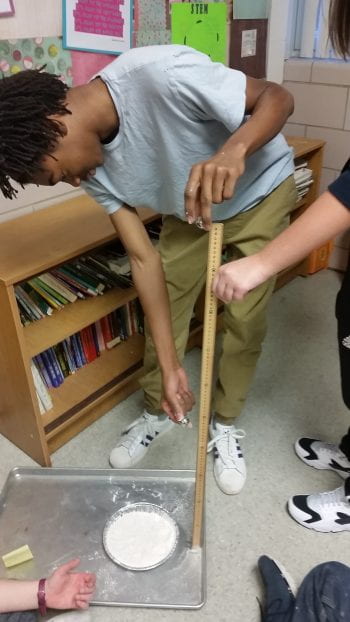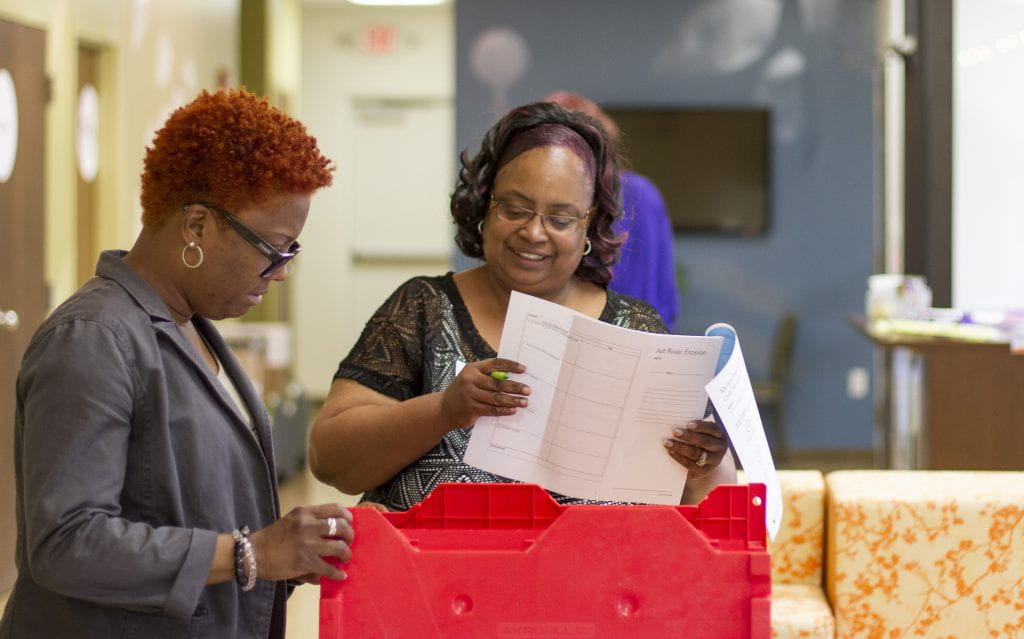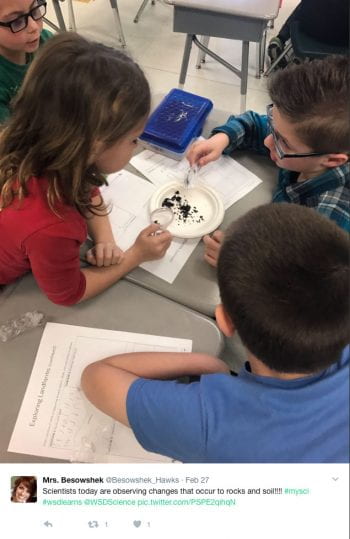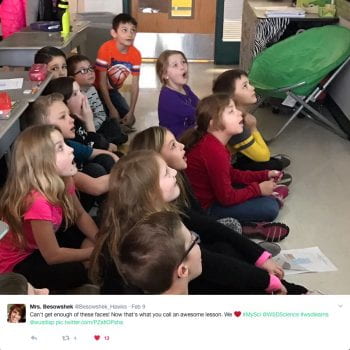In the big picture, Jennifer Besowshek is a Twitter newbie. She only joined the social media network in November 2016. But in that short amount of time this second-grade teacher at Prairie View Elementary School in the Wentzville School District has become an active user and one of her favorite subjects is mySci – the innovative curriculum developed by Washington University’s Institute for School Partnership (ISP).
Wentzville piloted one mySci K-5 unit at each grade level this past year. That’s how Besowshek came to know the program and became a huge fan, often tweeting photos of her students doing the lessons.
“My absolute favorite thing about mySci is that students are learning from their own discoveries and each other,” she said. “I love the student conversations that mySci sparks.”
mySci abandons the traditional teaching methods of the heavy textbook and the heavier lectures. Everyday there is an interaction of some kind, whether it’s hands-on activities, reading a book, looking at pictures or watching a short video snippet. All of these resources come into the classroom in mySci kits — big, red boxes neatly packed with everything a teacher needs for a given lesson from books to batteries to lightbulbs.
“I love that you provide everything for us in the kits,” Besowshek said. “I don’t have to do outside planning to supplement my curriculum.”
Recently her class did stations where they explored different rocks and soil. All the necessary materials were included in the kits, even paper plates.
“It’s the little things that make a huge difference,” she said.
Jennifer Pointer is also a fan of the little touches.
“I’m not searching all over for materials. It’s all there,” said Pointer, an eighth grade science teacher at Rogers Middle School in the Affton School District. The district piloted mySci this year in their two elementary schools and one middle school.

She’s especially excited about the hands-on activity opportunities. She explains that in previous years she has felt a deficit in that department and feels mySci offers a solution.
“Kids say they feel smart after working with the kits. They are so excited about creating something and knowing what it means,” she said. “The kinetic molecular theory sounds like a bunch of garbage when you say that, but the students continuously prove the kinetic molecular theory in their activities.”
And it’s not just the students that feel smarter. mySci has boosted Pointer’s feelings about her abilities.
“I honestly feel more accomplished as a science teacher. That is so important. If you feel accomplished, your students feel accomplished.”
They’re so engaged
Judging from the oohs and aahs coming from her students, Besowshek considers mySci a big hit with her class. There’s even photographic proof. She tweeted a photo of her students oohing and aahing as they explored frozen bodies of water.
“They have so much fun and they’re so engaged,” she explained.
Most of the team working to create the mySci curriculum are former teachers. Something that gets a big plus from Besowshek.
“They kits are very teacher friendly and easy to use,” she said.
That’s music to Skyler Wiseman’s ears. The mySci curriculum and instructional specialist has 24 years of teaching experience under her belt – and agrees that teacher involvement has been essential to the program’s success.
“As a result of teachers writing, piloting and revising the program, other teachers recognize the authenticity of mySci and feel comfortable using it,” Wiseman said.
Because mySci has the backing of Washington University that carries a lot of weight for Pointer and parents in her district.
“It’s a quality product because it’s coming from Wash U,” she said. “When I say I’m doing this Wash U curriculum that’s called mySci parents perk up.”
In addition to piloting mySci K-5, Wentzville also piloted one 6-8 module at each grade level. They will be using it for 6th grade district-wide next year.
The Affton School District will be using mySci district-wide next year.
Teachers: We love to see how you implement mySci in your classroom. When sharing via social media, please include our Twitter handle or hashtag #mySci. If you’re not engaged on social media but have something to share, email us and we will share it online for you. If it’s a photo, please include a short description.
April 2017 | by, Myra Lopez


